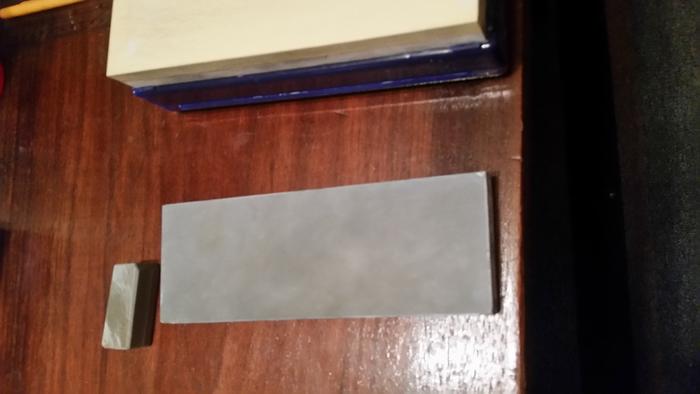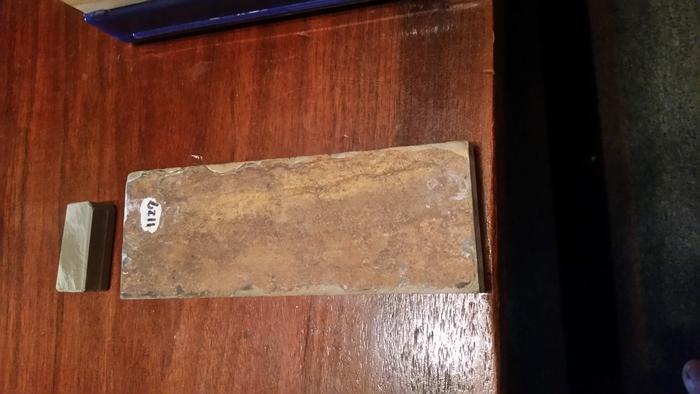Results 1 to 6 of 6
 12Likes
12Likes
Thread: How to get the best out of Okudo Asagi Tomae
-
02-11-2017, 12:34 AM #1Member

- Join Date
- Jan 2016
- Location
- Georgia, USA
- Posts
- 83
Thanked: 4 How to get the best out of Okudo Asagi Tomae
How to get the best out of Okudo Asagi Tomae
I bought a Jnat, my first natural hone, it is an Okudo Asagi Tomae lv 5+ with a tested Tomo nagura. I want to be sure that I use the stone to it's full potential. My tomo nagura feels sticky when I try to build a slurry, the stone is already lapped flat and polished smooth. I want to know how much pressure I need to use with the tomo or if there is a specific way to do it. I have read several forums about using Jnats and have a basic understanding, but feel like I need to know more. How many laps should I expect to make on a stone of this hardness to notice any improvement after a Naniwa 12k? Thanks!
-
02-11-2017, 01:06 AM #2< Banned User >

- Join Date
- Oct 2016
- Location
- Saratoga, CA
- Posts
- 597
Thanked: 59
It's really impossible to tell you because each stone has it's own unique behavoir. You just have to learn the stone and what works for it while you are testing it. Sometimes I will monitor the progress on a loupe or microscope.
Sometimes I do circles on mine, sometimes I like the x strokes. Slurry? Try everything, heavy, light, medium. As far as pressure is concerned, I never use heavy pressure, usually a medium to light blade pressure and when I'm satisfied I will be done soon I give it a bunch of light slurry, razor blade pressure only x strokes. I always finish with light pressure x strokes.
In all cases I have found it to be relaxing and fun.
We would love to see a picture of your stone. Especially the Okudo Asagi's. Incredible stones, I have one too.
And your's is Tomae! Yummy deeeep stratum, Lovely!!Last edited by Aerdvaark; 02-11-2017 at 01:20 AM.
-
02-11-2017, 03:34 AM #3

Make sure both the tomo and hone have had water on them for a couple of minutes before you try to make slurry. If they're both wetted and IMMEDIATELY used they tend to stick together.
Use the lightest pressure you can to generate the slurry in a couple of minutes.
My typical finishing routine on a jnat is 2x20 circles and ellipses (40 total) followed by 40 x-strokes, flipping the blade each stroke.
Good honing!
Cheers, Steve
-
02-11-2017, 03:37 AM #4

I would take a razor that just needs a touch-up, or one that has been brought up to just about shave-ready, and then start with your Jnat. Make a thin slurry (very thin), and work it using normal techniques, adding drops of water every so often when it dries out. Try to use the same slurry for the whole time, adding only if you need a bit more. Let it dilute. Use lower pressure over time. Eventually, do the light zigzag Iwasaki technique (or not, as you like), and basically quit when you think it's done. Look at the edge with a loupe and you'll eventually see an even hazy/speckle uniform finish on the edge. Strop just a few times and shave.
I often shave directly off the stones. They are great fun, and you can use a whole range of natural on that stone, from botan on up to a hard, fine tomo. Lots of resources on the net now.
-
02-11-2017, 02:27 PM #5Member

- Join Date
- Jan 2016
- Location
- Georgia, USA
- Posts
- 83
Thanked: 4

 This is my stone both sides beside my Norton 8k for comparison. Thank you for the replies. I'm excited to learn with it.
This is my stone both sides beside my Norton 8k for comparison. Thank you for the replies. I'm excited to learn with it.
-
02-11-2017, 08:38 PM #6Senior Member

- Join Date
- Oct 2015
- Location
- Switzerland
- Posts
- 104
Thanked: 52
this seems to be one of alex' stones. good!
if the tomo nagura is sticky, round the flat side on a diamond plate or on sandpaper. second choice would be to file two grooves perpendicular to each other into the flat side of the tomo. like that you have four small flat areas instead of one which reduces stickyness a lot.
as others have suggested use little pressure. i don't recommend tilting the tomo to accelerate things. sometimes this works well, but with harder tomos (like yours) you might scratch the hone.
improvement after a 12k? i don't really know as i don't use such fine synthetic stones before a natural stone. i'd expect a different edge, maybe smoother, but not necessarily sharper.
good luck!
ragards,
hans



 LinkBack URL
LinkBack URL About LinkBacks
About LinkBacks






 Reply With Quote
Reply With Quote